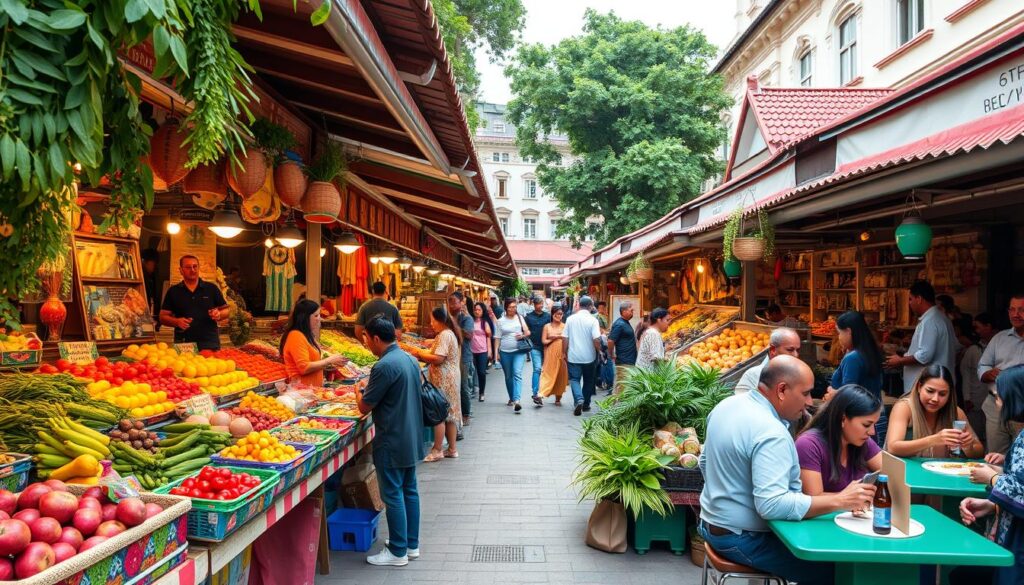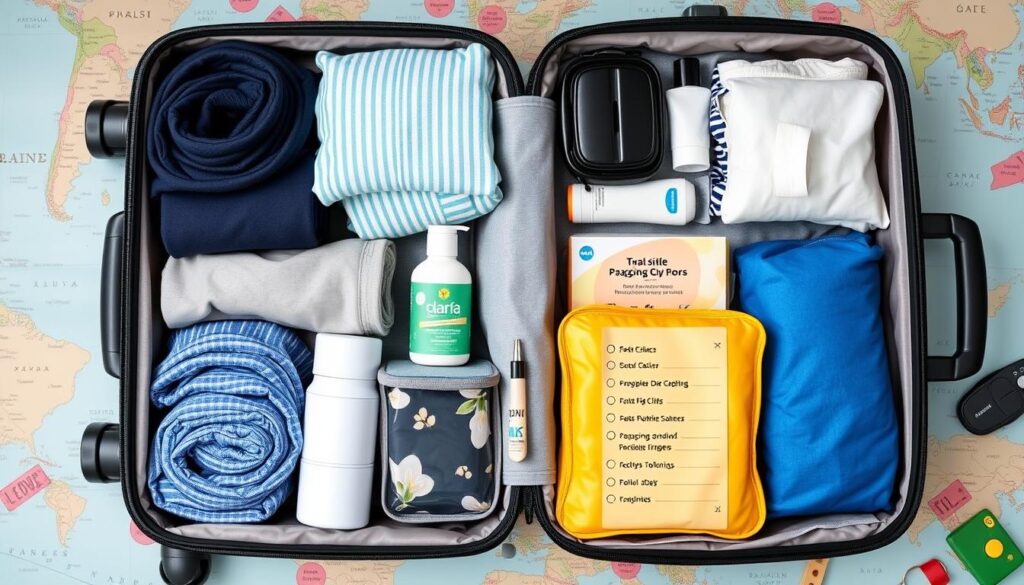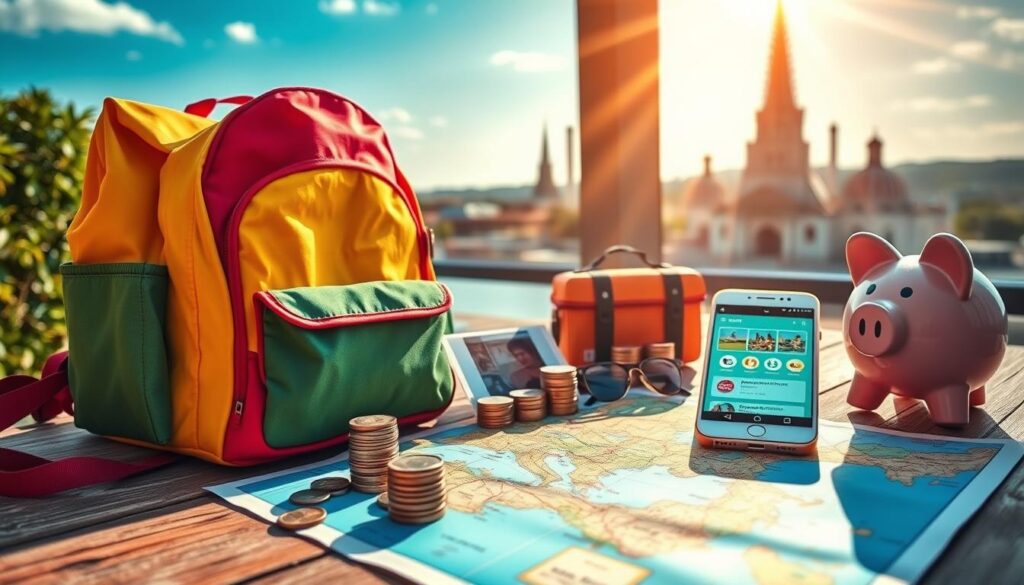Want a vacation but worried about the cost? Relax! With these budget travel tips, you can have a fun trip without spending too much. We’ll show you how to plan smart and make choices that save money. Your trip will be memorable and easy on your wallet.
Planning a vacation doesn’t have to empty your wallet. Booking flights at the right time and choosing off-peak seasons can save a lot. Did you know booking domestic flights a month in advance is often cheapest? For international trips, aim for 2-4 months ahead. These tips can help you save a lot on your next adventure.
Key Takeaways
- Book flights 1-4 months in advance for best prices
- Travel during off-peak seasons for lower costs
- Use public transportation to save on travel expenses
- Consider alternative lodging options like hostels or vacation rentals
- Utilize travel rewards points to offset trip costs
- Pack light to avoid extra baggage fees
- Explore free local attractions to save on entertainment
Pre-Trip Planning: Essential Budget Travel Tips
Smart planning is key to economical travel planning. By following these tips, you can stretch your budget and explore cheap travel destinations without breaking the bank.
Booking Flights 1-4 Months in Advance
Timing is crucial when booking flights. For domestic trips, aim to book 1-4 months ahead. International journeys require a 2-4 month lead time. This strategy often yields better rates, leaving more money for your actual vacation.
Choosing Off-Peak Travel Seasons
Traveling during off-peak or shoulder seasons can significantly reduce costs. You’ll avoid high prices and crowds while enjoying a more authentic experience. For example, visiting Thailand in May can be more budget-friendly, with $1 USD equating to 36.81 Thai Baht.
Setting Up Price Alerts and Fare Tracking
Utilize price alerts and fare tracking tools to snag the best deals. Websites like Skyscanner or Google Flights compare prices across airlines and booking sites. Consider flying on Wednesdays or Saturdays when demand and prices typically dip.
| Currency | Exchange Rate (as of May 31, 2024) |
|---|---|
| Thai Baht | 36.81 per $1 USD |
| Argentine Pesos | 893.71 per $1 USD |
| Guatemalan Quetzales | 7.77 per $1 USD |
| Hungarian Forints | 359.07 per $1 USD |
By implementing these pre-trip planning strategies, you’re setting the stage for a budget-friendly adventure. Remember, thorough research and flexibility are your best allies in uncovering cheap travel destinations and maximizing your travel budget.
Strategic Transportation Choices for Cost Savings
Choosing the right transportation can save you a lot when you’re on a tight budget. It’s important to think about your options to make travel affordable. Here are some smart ways to save money on transportation during your trip.
When deciding between flying and driving, consider the costs. Road trips might be cheaper and more enjoyable. If you do fly, booking 1-4 months in advance can get you the best prices.
Public transit is usually cheaper than renting a car. Many cities have good bus and subway systems. Biking is also a cheap and fun way to see the city like a local. Use rideshare apps and fare calculators for occasional rides to estimate costs.
“The real voyage of discovery consists not in seeking new landscapes, but in having new eyes.” – Marcel Proust
To save on driving, pack light to improve fuel efficiency. Avoid gas stations near highways, as they are often more expensive. For flying, consider TSA PreCheck or Global Entry. Some credit cards cover these fees, saving you time and money at airports.
| Transportation Mode | Pros | Cons |
|---|---|---|
| Driving | Flexible, scenic routes | Gas costs, longer travel time |
| Flying | Fast for long distances | Can be expensive, airport hassles |
| Public Transit | Affordable, local experience | May be slower, limited schedules |
| Biking | Very cheap, great exercise | Weather dependent, limited range |
By choosing wisely how you travel, you can make your budget go further. Remember, the journey is part of the adventure when you’re on a tight budget!
Smart Accommodation Strategies
Finding affordable places to stay is crucial for budget travel. We’ll look at ways to cut costs without losing comfort.
Alternative Lodging Options
Vacation rentals, hostels, and guesthouses are cheaper and offer unique stays. Websites like Airbnb and Booking.com have many options. In Australia, hostels and guesthouses are affordable and let you experience local culture.
Negotiating Hotel Rates
Don’t be afraid to negotiate. Call hotels directly for discounts for students, government workers, or group members. Hotels near airports or under renovation often have lower prices. Prices drop during off-peak times to fill rooms.
Maximizing Rewards Programs
Hotel loyalty programs and credit card rewards can save money. Programs like Hilton Honors and World of Hyatt offer free perks. Use free night certificates to stretch your budget.
| Accommodation Type | Average Cost per Night | Best For |
|---|---|---|
| Hostels | $20 – $40 | Solo travelers, social atmosphere |
| Guesthouses | $30 – $60 | Local experience, budget couples |
| Vacation Rentals | $50 – $100 | Families, longer stays |
| Budget Hotels | $60 – $120 | Short stays, basic amenities |
Being flexible is key for saving money on trips. Look for last-minute deals and compare prices. With these tips, you can find great places to stay without spending too much.
Food and Dining Money-Saving Hacks
Travelers know that food can quickly add up. With prices rising over 8% in the US, finding cheap eats is crucial. Here are some tips to save on meals during your trips.
Shopping at Local Markets
Local markets are a treasure trove of affordable food and culture. You can save 25% to 50% by choosing local dishes in less crowded spots. Plus, you can buy fresh ingredients if you have a kitchen, saving $20 to $30 per person daily.

Smart Restaurant Choices
Choose your dining spots wisely. Lunch specials in Europe can be 30-40% cheaper than dinner. In the US, lunch at fancy restaurants is often less expensive than dinner. Street food is also a cheap option, costing just a few dollars worldwide.
Self-Catering Options
Cooking a few meals at your vacation rental can save $50 – $100. Hotels with free breakfast save you money. Don’t forget to bring a refillable water bottle to avoid expensive drinks at airports. For longer stays, cooking your own meals can cut down food costs a lot.
By using these food and dining tips, you can enjoy your trip more without breaking the bank. These ideas help you try new foods while keeping your vacation affordable.
Maximizing Travel Rewards and Points
Travel rewards and credit card points can cut down your vacation costs. Smart travelers use loyalty programs to get great value. Let’s look at how to get the most from these perks.
Credit cards are key for earning points. The American Express® Gold Card, for example, gives good rates for dining and groceries. Look for cards with big sign-up bonuses. The American Express® Business Gold Card gives 100,000 Membership Rewards® points after spending $15,000 in the first three months.
When using points, compare airlines for the best deals. United Airlines might ask for 60,000 miles for a round-trip to Honolulu. But Turkish Airlines only needs 15,000 miles. For trips to Europe, All Nippon Airways (ANA) is a good choice. They offer round-trip economy flights for 55,000 miles and business class for 88,000 miles.
| Airline | Destination | Miles Required (Round-trip) |
|---|---|---|
| Turkish Airlines | Honolulu | 15,000 |
| Virgin Atlantic | London (from East Coast) | 20,000 |
| ANA | Europe (Economy) | 55,000 |
| ANA | Europe (Business) | 88,000 |
| Alaska Airlines | Asia (Business) | 100,000 |
Diversify your points balance for more flexibility. Points from American Express, Capital One, Chase, and Citi can be moved between programs. This lets you adjust to changing plans and find the best redemption rates.
Remember, rewards programs have expiration dates and rules. Keep up with these to use your points wisely and travel without overspending.
Packing Strategies to Save Money
Smart packing is key to budget travel tips. By mastering the art of packing light, you can save money and enjoy a hassle-free trip. Let’s explore some strategies to help you travel on a shoestring without sacrificing comfort.
Light Packing Benefits
Packing light offers many advantages for budget-conscious travelers. Many airlines charge up to $30 each way for checked bags. This can add $120 to a round trip for two people.
By limiting yourself to carry-on luggage, you avoid these fees. You also gain mobility, making it easier to use public transit at your destination.

Essential Items to Bring
Create a capsule wardrobe to maximize outfit options with minimal items. Choose versatile pieces in a base color and a secondary color that can be mixed and matched. Roll your clothes to save space and prevent wrinkles.
Don’t forget to pack a reusable water bottle and snacks. This helps avoid buying overpriced items while traveling.
Avoiding Extra Baggage Fees
Weigh your luggage before leaving for the airport to avoid unexpected fees. Consider booking flights with airlines like Southwest that don’t charge for checked bags. If you must check a bag, compare the cost of excess baggage fees with shipping your items separately. It might be cheaper!
| Packing Strategy | Potential Savings |
|---|---|
| Carry-on only | Up to $120 per round trip for two |
| Capsule wardrobe | Reduced luggage fees |
| Reusable water bottle | $2-$5 per day on bottled water |
| Packing snacks | $10-$20 per day on convenience foods |
Free and Low-Cost Attraction Planning
Travelers looking to save money find that cheap destinations offer great deals. By choosing free and low-cost attractions, you can enjoy your trip without overspending.
Many cities offer free walking tours. These tours let you see the sights and learn about the area’s history and culture for free. They often rely on tips, so you control how much you spend.
Check local tourism websites for free events or festivals. You might find art shows or live music that are both fun and budget-friendly.
Outdoor activities like hiking or visiting the beach are perfect for those watching their budget. They’re often free or cheap and offer unforgettable experiences in stunning settings.
| Attraction Type | Average Cost | Budget-Friendly Alternative |
|---|---|---|
| Museum Visit | $20 | Free museum days |
| City Tour | $50 | Free walking tour |
| Theme Park | $100 | Public park visit |
| Concert | $75 | Free outdoor performance |
Think about buying city passes or tourist cards. They can save you money by offering discounts on several attractions. This is especially helpful if you plan to see a lot of paid sights.
Smart Transportation Choices at Destinations
Planning budget-friendly trips means making smart choices about getting around. Transportation can eat up a big chunk of your travel budget. Here are some tips for navigating your destination without breaking the bank.
Public Transit Benefits
Public transportation is a budget traveler’s best friend. Buses, trains, and subways offer an affordable way to explore cities. Many cities provide multi-day passes that can lead to significant savings.
For instance, using public transit can help you save up to 50% compared to other options.
Walking and Biking Options
Walking tours are a fantastic way to discover a new place. Many cities offer free guided walks. This gives you a chance to learn about local culture without spending a dime.
Biking is another great option. Cities with bike-sharing programs provide an affordable and flexible way to get around. Plus, it’s eco-friendly!
Ride-Share Cost Management
When public transit isn’t an option, ride-sharing can be a good alternative. To keep costs down, use fare-splitting features and avoid peak times. Remember, flexibility is key in economical travel planning.
By choosing off-peak hours for your rides, you can save a considerable amount on transportation costs.
| Transportation Option | Cost Level | Benefits |
|---|---|---|
| Public Transit | Low | Affordable, immersive local experience |
| Walking/Biking | Very Low | Free/cheap, eco-friendly, intimate city experience |
| Ride-Sharing | Medium | Convenient, potential for cost-sharing |
By making smart transportation choices, you can stretch your travel budget further. Enjoy more of what your destination has to offer. Remember, the journey is part of the adventure in budget-friendly trips!
Digital Tools and Apps for Budget Travel
Travel apps and budget planning tools have changed how we plan trips. They offer many money-saving tips, making budget travel easier than before.
Apps like Hopper predict flight prices to find the best deals. Currency conversion apps help with budgeting abroad. TripAdvisor and Yelp suggest cheap places to eat.
Apps like Trail Wallet and TravelSpend track expenses during trips. Mobile banking apps, like ESB Financial’s, let you manage money and alert your bank of travel plans. These tools help budget travelers make smart choices and save money.
| App Category | Popular Options | Key Features |
|---|---|---|
| Flight Deals | Hopper, Skyscanner | Price predictions, alerts |
| Accommodation | Airbnb, Hostelworld | Budget-friendly options |
| Expense Tracking | Trail Wallet, TravelSpend | Budget management, categorization |
| Local Recommendations | TripAdvisor, Yelp | Affordable dining, attractions |
Using these digital tools, travelers can plan better, spend less, and enjoy more on their budget trips.
Timing Your Travel for Maximum Savings
Smart timing is key to affordable vacations. Knowing when to book and fly can lead to significant savings on your next trip. Let’s explore some frugal travel strategies to help you get the most bang for your buck.
Best Days to Fly
Midweek flights often offer better deals. Booking your flights on Tuesdays, Wednesdays, or Saturdays can result in lower fares. This simple change in your travel schedule could save you a bundle.
Seasonal Price Variations
Traveling during off-peak seasons is a golden rule for budget-conscious travelers. Prices for flights, hotels, and attractions drop significantly during these periods. Consider visiting popular destinations during their “shoulder season” – the sweet spot between peak and off-peak times.
Last-Minute Deal Strategies
For the flexible traveler, last-minute deals can offer incredible savings. Sign up for fare alerts from airlines and travel websites. Platforms like Google Flights and Skiplagged can help you snag discounted last-minute flights or take advantage of hidden city fares.
Remember, timing isn’t just about when you fly. Booking international flights 6 months in advance and domestic flights 2-3 months ahead often yields the best prices. By mastering these frugal travel strategies, you’ll be well on your way to enjoying more affordable vacations without compromising on experience.
Local Currency and Payment Strategies
Smart travel money tips can save you big on your next adventure. Planning ahead for foreign currency exchange is crucial. Before you leave, get a credit card with no foreign transaction fees. These can save you 2% to 3% on every purchase abroad.
Let your bank know about your travel plans to avoid card blocks. Upon arrival, use bank ATMs for local cash. They offer better rates than airport kiosks.
In many places, cash is king and might even score you discounts. But don’t go overboard – some countries have high-value coins that can catch you off guard. A mix of cash and cards is your best bet.
Watch out for sneaky fees when paying. Avoid Dynamic Currency Conversion, which can double your exchange costs. Always pay in local currency to sidestep extra charges of up to 6%.
For tech-savvy travelers, check if Apple Pay or Google Pay are widely accepted at your destination. These can be handy alternatives to carrying loads of cash.
Lastly, brush up on tipping customs to budget wisely. With these strategies, you’ll stretch your travel dollars further and focus on making memories, not counting pennies.
FAQ
How far in advance should I book flights for the best deals?
What are some budget-friendly accommodation options?
How can I save money on food while traveling?
What’s the best way to use travel rewards and credit card points?
How can I avoid extra baggage fees?
Are there ways to find free or low-cost attractions at my destination?
What’s the most cost-effective way to get around in a new city?
Are there any helpful apps for budget travel?
When is the best time to travel for the lowest prices?
What’s the smartest way to handle local currency when traveling internationally?
Source Links
- Budget travel tips: How to save money on travel | Fidelity
- 12 Easy Money Saving Travel Tips – NerdWallet
- How To Travel on a Budget
- trip planning – the ultimate step-by-step guide – Happy Days Travel
- Travel Cost Optimization Tips for Budget-Conscious Companies
- Cut Business Travel Costs: Expert Tips and Strategies
- Cost of Travel: How to Compare and Budget for the Cost of Transportation and Accommodation – FasterCapital
- How to travel on a budget: Our 9 best tips ‹ GO Blog | EF United States
- Smart Spending Strategies: Maximizing Travel Experiences on a Budget
- Smart Savings: 12 Easy Money-Saving Travel Tips for Thrifty Adventurers
- How to Save Money on Food While Traveling
- 22 Ways to Eat Cheap & Save on Food While Traveling on Vacation – Money Crashers
- How to Eat Cheap When You Travel the World (Updated 2024)
- How to make a travel budget using points & miles – Lonely Planet
- A Beginner’s Guide to Traveling on Points and Miles – NerdWallet
- Travel Hacking 101: Beginner’s Guide to Maximizing Travel Rewards
- How to Pack a Suitcase that Saves You Money
- 10 Money Saving Tips for Budget Travel
- Budget-Friendly Tips for Your Next Adventure
- How to Travel Cheaper: A Beginner’s Guide to Budget Travel
- How to travel on a budget? Guide and tips for budget trip – Blog | Freetour.com
- Budget Travel Tips: How to Save Money While Traveling
- How to Travel on a Budget: 50 Practical Tips!
- How to Travel in Budget—Our Expert Tips
- Budgeting for Travel: How to Explore More for Less
- The Best Travel Apps for 2024
- How to Save Money on Travel: A HUGE list of tips and tricks…
- 6 Tips for Saving Money When You Travel – Georgia Heritage FCU
- Should You Pay in Local or Home Currency When Traveling Abroad?
- Handling Money Abroad | Study Abroad Center
- 18 Tips for Traveling on a Budget | Capital One

